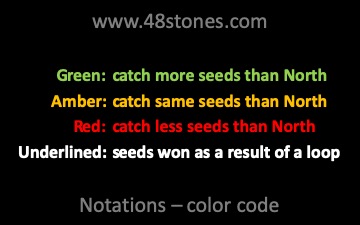How to use this page?
This section inventories all the endgames that Oware players encounter and recognise the most. For each position, South is to play. The solution of the move that gives South most of the seeds (aka the best possible move) is hidden, allowing time for study!
To reveal the solution:
- Mobile users: tap onto the diagram (tap outside the diagram to flip it back)
- Desktop users: mouse over the diagram
For a quick reading and assessment, there is colour code (see picture).
Have fun!

2 Seeds
Loop
Basic rotating positions with 2 seeds. The game stops and each player receives 1 seed each.
3 Seeds
Loops
Basic rotating positions with 3 seeds.
Exercise
A critical decision to make: do you keep your seeds (play left-most pit) or do you give away your seed (play right-most pit)?
4 Seeds
Loop
Playing the left-most pit accelerates the seeds, pushing them out, fastest to North. Pulling them instead (moving from right to left) slows down the progress of the seeds.
Exercise
A critical decision to make: should we defend (play left-most pit) or attack (play right-most pit)?
6 Seeds
Classic
Situation encountered very frequently and that usually makes the difference in winning the game. Very often, this position is repeated when each player keeps the 3 seeds, until forced to give them to the other player. The game stops and seeds are distributed evenly between the player.
Yet it is not a “loop” per se. There is a way to exit this repeating situation, where each player chases the tail of the other player and catch eventually, leaving the game in the 2-seed loop (ref. above).
What is the move to avoid playing or else lose all the seeds?
Exercise
A must-know situation, which makes the most experienced players win all of the seeds. Can you find which move South must play to win all 6 seeds?
7 Seeds
Loop
This situation is encountered less frequently. Recognising it as a loop helps handling the seeds, so one doesn’t give up more seeds than necessary to the other player, when forced to move.
Classic
Situation encountered very frequently and results in repeating positions. The routine of the different starting moves need to be explored before stating that a loop is inevitable.
What is the move to avoid playing or else lose all the seeds?
Classic
Situation encountered less frequently where the end-result is not that obvious.
Although the solution seems disappointing, South can take its chances by playing a specific move. Indeed there is 1 move that South can play, which will force North to play and respond perfectly, or else, any mistake that North makes will yield seeds for South to win.
Can you find which move it should be?
8 Seeds
Classic
Situation encountered very frequently and that usually makes the difference in winning the game. Very often, this position is repeated when each player keeps the 4 seeds, until forced to give them to the other player. The game stops and seeds are distributed evenly between the player.
Yet it is not a “loop” per se. There is a way to exit this repeating situation, where each player chases the tail of the other player and catch eventually, leaving the game in the 4-seed loop (ref. above).
What is the move to avoid playing or else catch only 3 seeds?
Exercise
This situation is encountered quite frequently. The opponent is outnumbered and playing first doesn’t help. Yet there is only 1 move to make that will allow you to keep these 3 seeds.
Exercise
There is a general belief that this positon repeats itself, where everyone keeps its seeds, ending in a 5-3 result.
There is actually 1 move that allows South to capture ALL the 8 seeds. This is a very nice routine to study!
9 Seeds
Classic
These positions deserve a whole chapter to describe the best routines. The ambition of the 48Stones project is to identify the end-result of such positions when the routine is played perfectly.
Can you recognise the best moves that South can play?
10 Seeds
Classic
Same as for the 9-seed classic endgames, indicating only the end-results. Enjoy!
11-Seed and 13-Seed loops
These loops are treated in a dedicated page, as they are difficult to recognise and execute.
If there are remarkable endgames that you would like to see the solution of, please reach out at research@48stones.com and I will publish it for you.